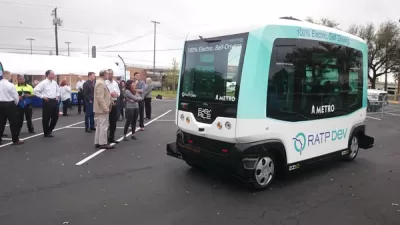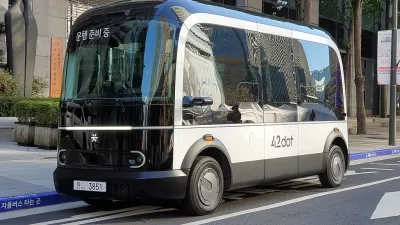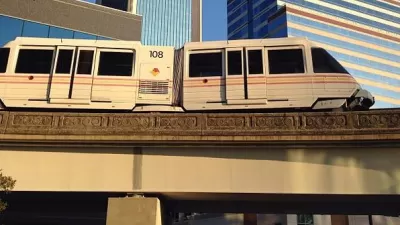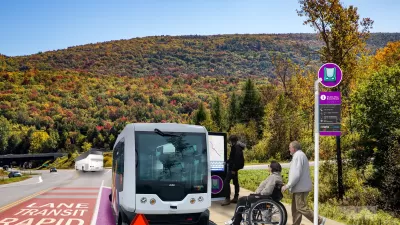There is no shortage of autonomous shuttle services operating around the United States, which means there are plenty of lessons to be learned.

Chris Teale surveys the landscape of automated shuttle pilots around the United States and finds a significant number of case studies to choose from.
"Cities including Detroit, Denver, Columbus, OH and Las Vegas have already piloted autonomous shuttle buses, which typically carry 10 people or less on a fixed route through a section of their downtowns," according to Teale.
"Meanwhile, the likes of Providence, RI, Orlando, FL and New York City are set to launch their own service in the coming months, with companies like May Mobility and Optimus Ride among the partners to provide the shuttle technology."
According to Teale, the adoption of autonomous shuttles is widespread enough to start evaluating for lessons on the impact of the services on public transit, the broader urban transportation system, and public perception of autonomous vehicles.
Teale also notes that many autonomous shuttle programs have encountered challenges. "Las Vegas’ pilot program garnered some negative publicity after a minor accident when a delivery truck backed into one of its shuttles," for instance, and "Denver struggled with one of those winter storms just a few months after its Regional Transportation District (RTD) transit agency and its partners launched the shuttle near a commuter rail station and a new development."
Teale also visits the example of Ann Arbor, where autonomous shuttles operates on campus at the University of Michigan. The university already released a report on how to launch a driverless shuttle with lessons specifically about the city's streets and transportation system.
FULL STORY: How autonomous shuttles are changing city transportation

Alabama: Trump Terminates Settlements for Black Communities Harmed By Raw Sewage
Trump deemed the landmark civil rights agreement “illegal DEI and environmental justice policy.”

Study: Maui’s Plan to Convert Vacation Rentals to Long-Term Housing Could Cause Nearly $1 Billion Economic Loss
The plan would reduce visitor accommodation by 25% resulting in 1,900 jobs lost.

Planetizen Federal Action Tracker
A weekly monitor of how Trump’s orders and actions are impacting planners and planning in America.

Waymo Gets Permission to Map SF’s Market Street
If allowed to operate on the traffic-restricted street, Waymo’s autonomous taxis would have a leg up over ride-hailing competitors — and counter the city’s efforts to grow bike and pedestrian on the thoroughfare.

Parklet Symposium Highlights the Success of Shared Spaces
Parklets got a boost during the Covid-19 pandemic, when the concept was translated to outdoor dining programs that offered restaurants a lifeline during the shutdown.

Federal Homelessness Agency Places Entire Staff on Leave
The U.S. Interagency Council on Homelessness is the only federal agency dedicated to preventing and ending homelessness.
Urban Design for Planners 1: Software Tools
This six-course series explores essential urban design concepts using open source software and equips planners with the tools they need to participate fully in the urban design process.
Planning for Universal Design
Learn the tools for implementing Universal Design in planning regulations.
Caltrans
Smith Gee Studio
Institute for Housing and Urban Development Studies (IHS)
City of Grandview
Harvard GSD Executive Education
Toledo-Lucas County Plan Commissions
Salt Lake City
NYU Wagner Graduate School of Public Service





























